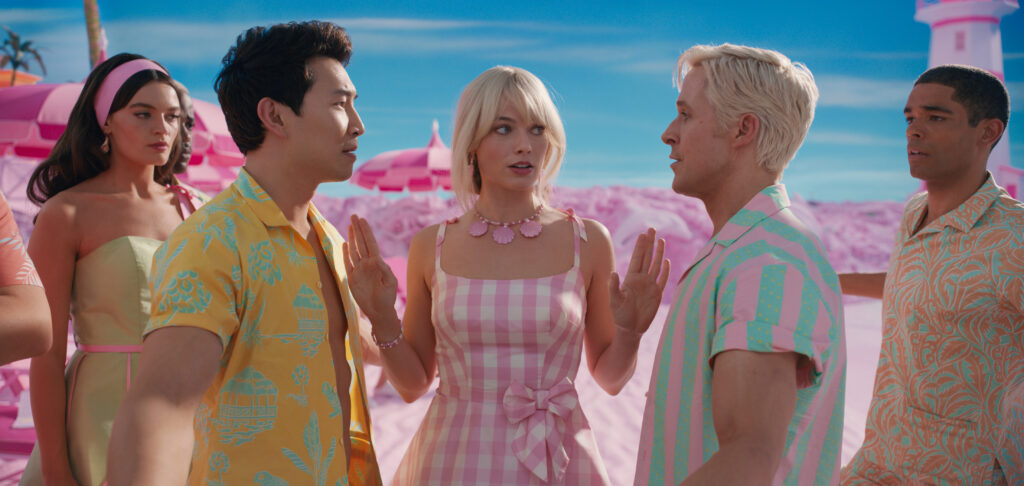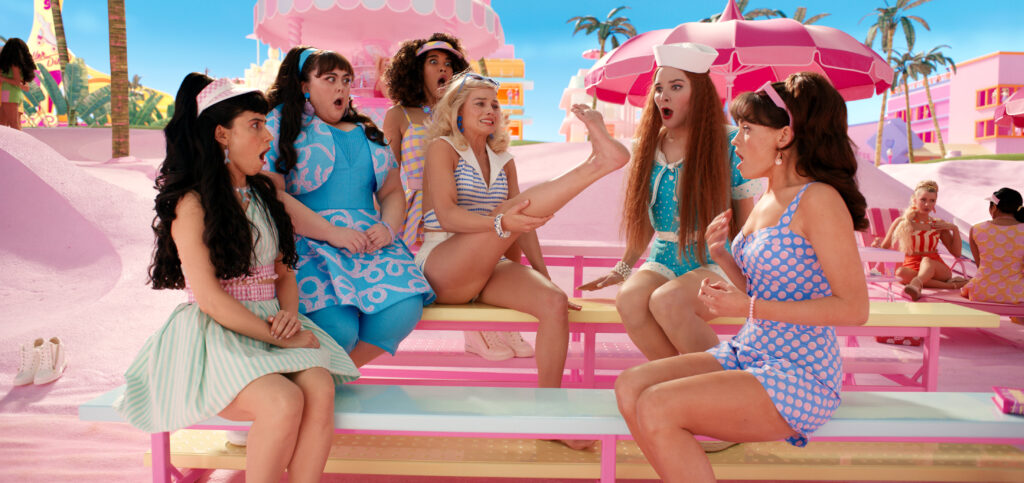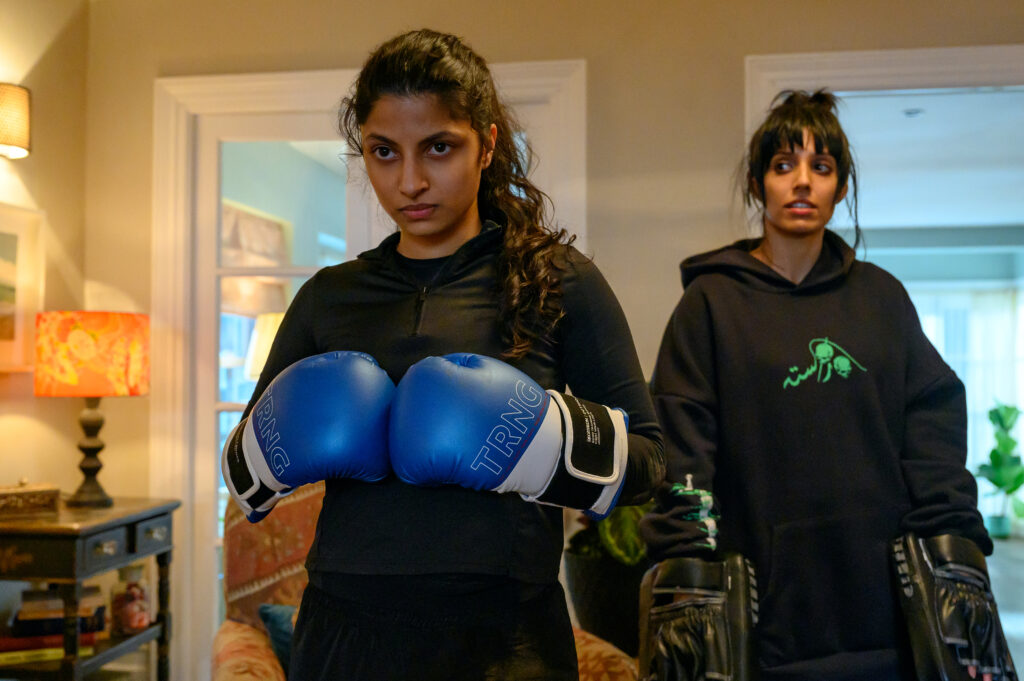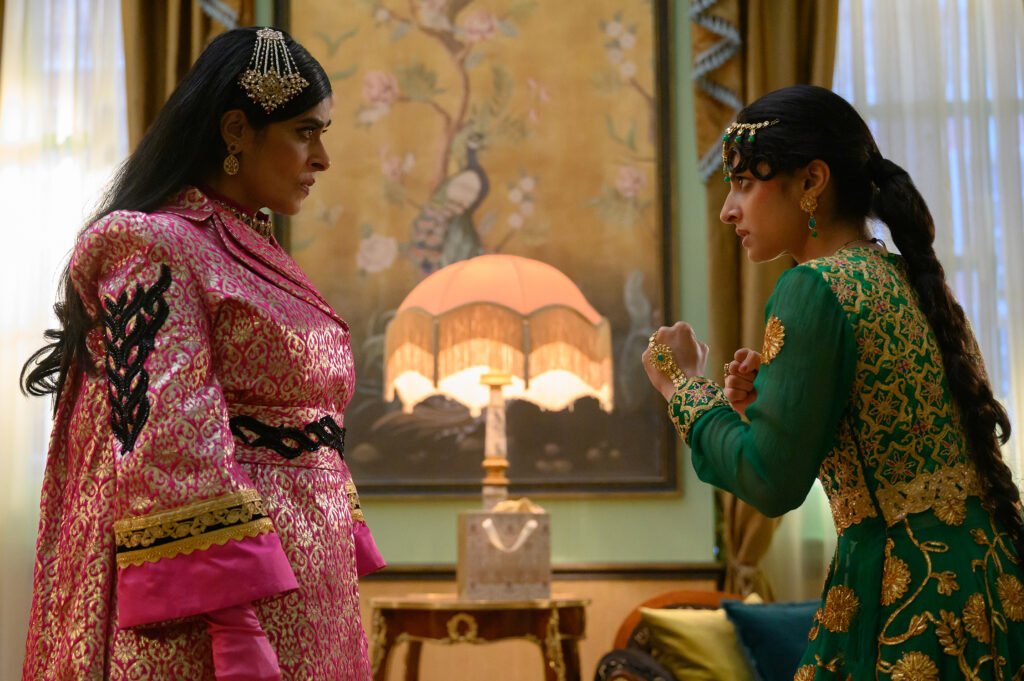July 19, 2023
by Carla Hay

Directed by Greta Gerwig
Culture Representation: Taking place in Barbie Land and in “the real world” in the United States, the comedy film “Barbie” features a predominantly white cast of characters (with some African Americans, Latinos and Asians) portraying Barbie dolls and human beings.
Culture Clash: Barbie and Ken, who are two of Mattel’s most famous dolls, leave Barbie Land to venture out into the real world, and they encounter humans who have various reactions.
Culture Audience: “Barbie” will appeal primarily to people who are fans of the Barbie brand and campy comedies that have pointed observations about society and feminism.

Despite a few parts of the screenplay being clumsy and meandering, “Barbie” is a nearly pitch-perfect comedy in its blend of satire and social commentary. The production design, costume design and casting are impeccable. The musical numbers are a bonus. If you like pop-culture-drenched comedies that can appeal to many generations (but adults will understand most of the jokes), then “Barbie” is the type of movie for you.
Directed by Greta Gerwig (who co-wrote the “Barbie” screenplay with Noah Baumbach), “Barbie” is candy-hued madcap adventure that sometimes gets overstuffed and unfocused in what it’s trying to say. It’s an occasionally bumpy ride that’s still worth the journey, but it’s best appreciated by people who are attuned to the impact that Mattel’s Barbie dolls have had on the perception of “feminine ideals.” People’s views of the “Barbie” movie will likely be affected by their views of Barbie dolls.
Barbie dolls (and what they represent) have been loved, hated, and somewhere in between by countless numbers of people, ever since the first Barbie dolls were sold in 1959. Within the Barbie toy brand are dolls with other names, but the Barbie doll name is iconic for various reasons. Barbie having a woman’s body and an entire imaginary world built around her have become part of Barbie’s image of being a “superstar” doll.
The “Barbie” movie acknowledges this impact from its opening scene, where voiceover narrator Helen Mirren is heard saying, “Since the existence of time, there have been dolls—baby dolls.” It’s a spoof of the opening scene from the 1968 sci-fi classic “2001: A Space Odyssey.” The “Barbie” movie then shows girls playing on a beach with baby dolls until a giant Barbie (played by Margot Robbie) suddenly appears on the beach, in a one-piece, black-and-white-striped swimsuit, like a doll version of Godzilla. The girls on the beach quickly smash and abandon their baby dolls and are in awe of Barbie.
Over the years, Mattel has presented Barbie as different races, occupations and body sizes, in order to deflect criticism that Barbie is not diverse. The “Barbie” movie does the same thing too. It also pokes fun at the stereotype that the “ideal” Barbie is supposed to be thin, blonde and pretty, by naming its protagonist Stereotypical Barbie (played by Robbie, one of the producers of the movie) and having her do a lot of stereotypical things that an eternally cheerfully doll would do. Barbie lives in fantastical world called Barbie Land, where the majority of everything is in pink, and parties often feature well-choreographed song-and-dance numbers.
But then, this Barbie begins to see signs that she’s not as “perfect” as she thought she was. Barbie starts to have dark thoughts about death. Her feet—which are supposed to be in permanent “tip-toe” mode so she can easily slip into high heels—suddenly become flat fleet, much to the horror of the other Barbies in Barbie Land. The movie’s other Barbies who have prominent speaking roles are portrayed by Issa Rae (the president of Barbie Land), Hari Nef, Emma Mackey, Alexandra Shipp, Sharon Rooney, Ana Cruz Kayne, Ritu Arya, Dua Lipa and Nicola Coughlin.
In the “Barbie” movie, Stereotypical Barbie has a possible love interest named Ken (played by Ryan Gosling), just like Mattel has a Ken doll that’s supposed to be Barbie’s love interest. In the movie, there are also various Kens of different races and body sizes. The ones with prominent speaking roles are portrayed by Simu Liu, Kingsley Ben-Adir, Scott Evans, Ncuti Gatwa and John Cena. (Cena’s appearance in the movie is very brief: no more than two minutes.)
More often than not, the Barbies in Barbie Land co-exist peacefully with each other and the Kens and are in perpetual supportive “girl power” mindsets. The Kens in Barbie Land aren’t as friendly with each other, because they are often competing for the attention of the Barbies. Gosling and Liu portray the Kens who have the biggest rivalries with each other. It’s the movie’s way of saying that competitive male egos will always exist, even in so-called utopias. (After all, history has shown which gender is more likely to start wars on Earth.)
One male who’s not named Ken in Barbie Land is Allan (played by Michael Cera), who represents every sad-sack beta male who’s treated like an outcast misfit. Allan is not considered “cool” enough to be a close friend of the Kens in Barbie Land. And he’s not considered “attractive” enough to be swooned over by the Barbies in Barbie Land, although the Barbies treat Allan better than the Kens do.
The Barbies have their own outcast misfit: Weird Barbie (played by Kate McKinnon), a disheveled doll who was played with too hard by whoever used to own her. Weird Barbie is a moody, sarcastic nonconformist who prefers the real world over Barbie Land. Almost all of the Barbies in Barbie Land have no idea what the real world is about, but they have a vague concept that it’s an undesirable place.
Weird Barbie has some of the best lines in the movie. There’s a scene that has some snarky commentary about how Mattel makes all Barbie and Ken dolls with genital areas that are not explicitly detailed. Weird Barbie quips in this scene about the Ken character played by Gosling: “I’d to see what kind of nude blob he’s packing under those jeans.” There’s also a joke about discontinued Barbie dolls, including Midge (played by Emerald Fennell), who was controversial because she was pregnant.
The Ken played by Gosling is frustrated because he wants to have sleepovers at Stereotypical Barbie’s place. Stereotypical Barbie doesn’t think about sex and only wants to have female-only slumber parties, so Ken is always rejected when he asks Barbie to spend the night at her home. As Barbie tells Ken about her sleepover rules: “Every night is girls’ night.”
Stereotypical Barbie grows increasingly disturbed by signs that she’s turning into a different Barbie. In addition to having flat feet, Barbie also shows signs that she’s becoming klutsy, insecure and no longer “perfect.” Through a series of events, Stereotypical Barbie finds out from Weird Barbie that someone in the real world has been planning a Barbie with “irrepressible thoughts of death” and other non-Barbie-like characteristics that Stereotypical Barbie has been experiencing.
And so, to solve this mystery and to find the person who’s been messing with her “perfect” life, Barbie decides to go to the real world, right to the place where she was made: Mattel headquarters in the Los Angeles area. Because she’s a master traveler, she goes by land, air and sea in a quick montage. Barbie starts her journey on a road trip, and she’s surprised to find Ken has hidden in the back of her car, because he wants to go to the real world too.
The Mattel executives are an all-male team led by an unnamed CEO (played by Will Ferrell), who has more ego posturing and bluster than he has intelligence. His team consists of a bunch of “yes men,” except for a junior executive named Aaron Dinkins (played by Connor Swindells), who dares to be an independent thinker. The CEO is predictably a bumbling oaf.
Meanwhile, another Mattel employee named Gloria (played by America Ferrera) and her daughter Sasha (played Arianna Greenblatt), who’s about 12 or 13 years old, are big parts of the story. Sasha is a pouty adolescent who’s angry that her mother left her father, for reasons that aren’t fully explained in the movie. Sasha and her female friends hate Barbie dolls and aren’t afraid to say so.
“Barbie” director/co-writer Gerwig is an outspoken feminist, so it should come as no surprise that the movie has a lot of satire about misogyny, patriarchy and how people are treated or perceived a certain way because of gender and physical appearances. The female characters aren’t excused for terrible actions, since “Barbie” also lampoons “mean girls” who are bullies and snobs. “Barbie” is not a male-bashing film, but it does point out the privileges men often get just for being men. One of the funniest parts of the movie is when Ken discovers that the real world is the opposite of Barbie Land, such as men have most of the power in the real world.
“Barbie” stumbles a bit in the backstory for Gloria and Sasha. It could have been a better-developed part of the screenplay, because Gloria and Sasha just seem kind of thrown into the movie without viewers really getting much of a chance to know them before Gloria and Sasha become a big part of the story. The movie also doesn’t do enough with Barbie’s and Ken’s “real world” interactions with adults who don’t work for Mattel.
There’s a very children’s movie-type subplot about the Mattel CEO wanting to capture Barbie and Ken, in order to put both of these life-sized dolls back in their boxes. During a chase sequence through Mattel headquarters, Barbie finds refuge in a kitchen, where she meets an elderly woman named Ruth (played by Rhea Perlman), who shows up again later in a hilarious scene.
Robbie and Gosling are a very good comedic team in “Barbie,” with both playing their respective roles in an effectively funny tongue-in-cheek style. Robbie’s Barbie is naïve but resourceful and a quick learner. Gosling’s Ken proves that he’s not just a mindless “himbo” and he has very thoughtful side. McKinnon (whose Weird Barbie deadpan delivery is very amusing) is a true standout among the “Barbie” cast, but she isn’t in the movie as much as many people think she should have been.
Ferrell, who has played pompous jerks in many other comedies, doesn’t do anything new in “Barbie,” but people who like to see him in this type of role will find his performance to be what’s expected. Ferrera and Greenblatt give believable performances as a mother and a daughter working through their own issues. Ferrera’s Gloria character has had an interesting life that is only hinted at in the movie, especially when she gives a dramatic monologue at one point in the story. The rest of the “Barbie” cast members give serviceable performances.
The soundtrack music of “Barbie” has some predictable selections, including Cyndi Lauper’s “Girls Just Wanna Have Fun,” Spice Girls’ “Spice Up Your Life” and Lizzo’s “Pink.” Barbie has a personal theme song during her “real world” journey: Indigo Girls’ “Closer to Fine,” while Ken’s personal theme song after he discovers patriarchy is Matchbox Twenty’s “Push.” “Closer to Fine” and “Push” are inspired choices for the soundtrack, which includes “Barbie” co-star Lipa’s “Dance the Night,” Gosling’s “I’m Just Ken” and Billie Eilish’s “What Was I Made For?” Also on the soundtrack: Nicki Minaj and Ice Spice have a duet cover version of Aqua’s “Barbie Girl.”
Making a live-action “Barbie” movie is so much harder than it sounds. You can’t alienate the die-hard Barbie fans, but you can’t make it so sickeningly sweet that it will turn off people who have no interest in buying Barbie dolls. There’s some product placement in “Barbie,” but it isn’t aggressively obnoxious, like some product placement is in many other major studio movies. The “Barbie” movie is a lot like a Barbie doll: Some people will find it to be disposable entertainment, while others will be hooked and will become devoted fans.
Warner Bros. Pictures will release “Barbie” in U.S. cinemas on July 21, 2023.


